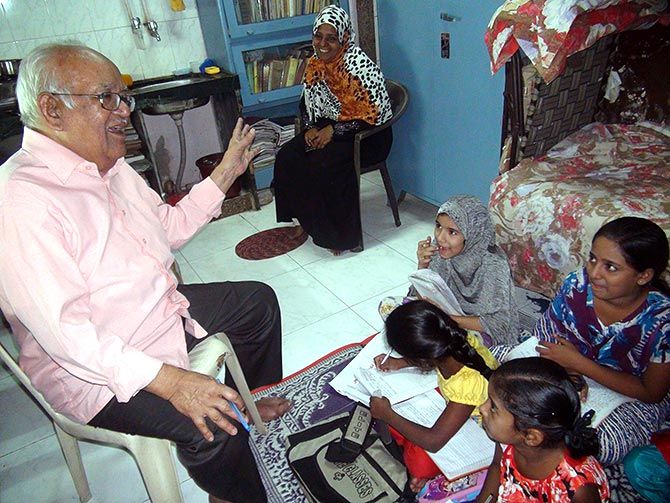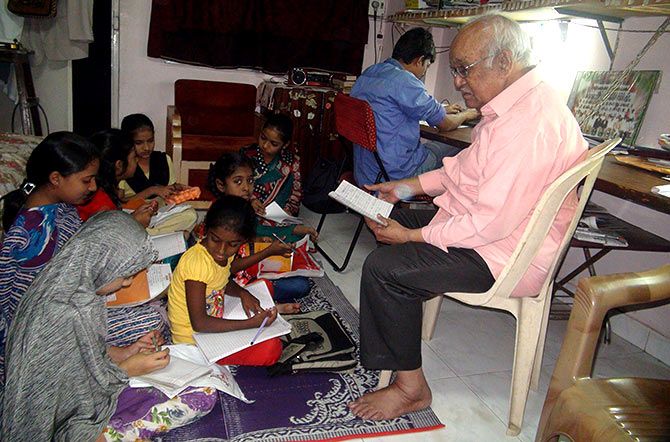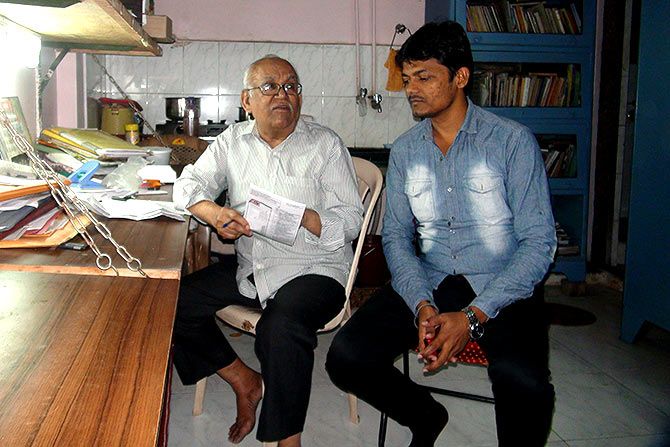'I've seen the craze for English education even among the poorest. But that is only for their sons. Parents feel thrilled when they see their sons going to school wearing a tie. They don't mind paying for their sons' private tuitions too.'
'But daughters are sent to municipal schools, madarsas, small schools where teachers with no teaching skills are paid Rs 2,000 or Rs 4,000. That's why more girls come to my class.'
Syed Feroze Ashraf, who has sent 500-odd girls (and a few boys) -- all first generation learners, children of grave-diggers, hawkers, rickshaw-drivers, tailors and watchmen -- to college, speaks to Jyoti Punwani. A Rediff.com Special.
 In the maze of slums in Jogeshwari East, north-west Mumbai, where the traffic never stops and people are always milling around, if you see burqa-clad girls hastening to the Ismail Yusuf College nearby, you can be sure many of them would be 'Uncle's' students.
In the maze of slums in Jogeshwari East, north-west Mumbai, where the traffic never stops and people are always milling around, if you see burqa-clad girls hastening to the Ismail Yusuf College nearby, you can be sure many of them would be 'Uncle's' students.
Syed Feroze Ashraf's 'Uncle's Classes,' which began in 1997, has by now sent 500-odd girls (and a few boys) -- all first generation learners, children of grave-diggers, hawkers, rickshaw-drivers, tailors and watchmen -- to college.
Some have graduated in English Literature, one did law, another became an air-hostess, many others run branches of 'Uncle's Classes' from their homes.
The Observer Research Foundation, a well-known think-tank, has now made a film on Ashraf, titled Uncle: The School in Himself. A few of Ashraf's students present at its premiere, broke down recalling the ways in which Uncle had gone out of his way to help them cross the unending obstacles they had to face.
The former Indian Oil employee, who shifted from quiet leafy Malad to crowded, noisy Jogeshwari, after experiencing for the first time, in the 1992-1993 riots, what it meant to be a Muslim in a Hindu-dominated society, speaks to Jyoti Punwani about the lessons learnt while teaching Mumbai's poorest.
In these last 17 years, you've been teaching children. What have you learnt about the education system?
A child's first school is the home. Unfortunately, adult Muslims are not educated. Even the first generation of educated Muslims has not come up even till today. So that basic is absent for Muslim children.
Thank God for maulvis! In the small madarsas they run, children at least get to learn the alphabet, so they can read bus numbers, road signs...
Thanks to these maulvis and the appas who go house to house teaching the Koran, even the poorest Muslim child gets to learn Urdu.
The school, the second place where a child gets education, is no use for you if your parents aren't literate. For such children, whatever is taught is totally strange and alien.
Textbooks are not written keeping the children of Govandi, Kurla, Jogeshwari (all suburbs in Mumbai) in mind. And parents can't help.
In college, it is even worse because suddenly, everything is in English, and such convoluted English!
I've written out entire lessons in simple sentences and made them mug it up just so that they pass. Because the moment they fail, their parents will stop their education.
I've fought with colleges so that these children can write their Class 12 exams in Urdu -- it is allowed by the university.
The second thing I've seen over these years is the craze for English education even among the poorest. But that is only for their sons.
The tragedy is that the big English schools don't like to admit children from these areas, so they are condemned to third-rate schools which put up boards saying 'St so-and-so academy' and have a uniform. Parents feel thrilled when they see their sons going to school wearing a tie. They don't mind paying for their sons' private tuitions too. That is why the number of boys coming to me has been declining.
But daughters are sent to municipal schools, madarsas, small neighbourhood schools where teachers with no teaching skills are paid Rs 2,000 or Rs 4,000. That's why more girls come to my class. It is free, so parents say ok, go if you wish.
Ironically, the outcome is the reverse. The girls study seriously, while schools have many complaints about our boys. Girls sit quietly with bowed heads and somehow, I don't know how, they keep studying.
The third school is society -- the child's mohalla -- and it couldn't care less. There is so much noise all around, people are abusing each other -- no one pauses to think that their children are studying.
Every evening, men hang around in addas. Can't they get together and provide a study room for their mohalla kids?
Working class Hindus do so; the Shiv Sena is conscious of this need. But Muslims? They will tell me -- 'You are doing good work.' Shouldn't they be helping me at least? Even our teachers don't care.
A mother just called me to complain that her son was caned for coming to school without shoes. Is that how you encourage a child to study?
Finally, it is the government's responsibility. Its policies are good, but they don't reach these children. There is no control or supervision. Take the midday meal; many children go to school only for that. Take teacher training. Nothing is done to motivate them.
A school came to me recently saying they had Class 9 children who couldn't write properly. They kept a teacher for them, it was no use. They told me to teach them in three months, before the final SSC year begins.
I asked my ex-students: Are you willing to take up this challenge? They were, but the school wasn't even ready to provide them a classroom!
The community should be doing all this. If a Class 9 student can't write, the community should be worried.
There is a perception that Muslim parents don't put much value on education. Is that true?
The majority of poor Muslims are Hindus converted from artisan communities. They didn't get educated because the family needed their skills; it was a matter of their livelihood.
A butcher's son needs to first learn how to cut mutton; how to slaughter a chicken; a tailor's son needs to help on the sewing machine.
So there was no time for education. Who will look after the scrap business, who will sit at the restaurant counter?
Very slowly, they have started sending their sons to school. For that, the community is to blame -- it didn't raise any hue and cry about education.
The way there is talk about Narendra Modi in every galli (lane), there should be talk about educating our children. There has been no social awakening on this issue. The government didn't do it either.
Maulanas now are taking up the anti-drug campaign. Why don't they take up a campaign that every child must pass the SSC? In Islam, there is so much emphasis on education. Can you describe your reaction when you first started teaching these kids?
Can you describe your reaction when you first started teaching these kids?
It was a shock. I had seen poverty in Jharkhand where I come from, but not such poverty and backwardness.
One of my students was the daughter of construction workers, living in the half-finished building where they worked, sometimes making do with the eggs of pigeons who nestled there.
I found a community ignorant and very innocent, knowing absolutely nothing. They were neither extremists nor even particularly devout, contrary to the image projected of them. They were just resigned to their fate.
I found a poverty of resistance in them: Allah ka bharosa hai, woh dekh lega, was their answer to everything.
Our society -- be it Hindu or Muslim -- encourages this by somehow accommodating everyone. Temples and masjids feed the poor; people donate.
That's why I wish I had started much earlier -- one generation could have been educated.
People like us stopped going to the local masjid, so our link with the community broke. That was our big mistake.
We couldn't have influenced the imam's sermons -- they don't give inflammatory sermons incidentally -- but we could have spent time with those who gathered there, exchanged views while lingering in the compound or over a cup of tea at the nearby Irani (cafe). There is a lot of interaction in the masjid after namaaz; people do distribute pamphlets there.
Did you have to work on the parents too?
Oh yes. I had to tell them: Don't beat your child. Make sure to give her something to eat while she is studying, even if it is a vada pav. They were all large families living in one room homes, so I would insist that two hours a day, switch off the TV, don't allow guests and don't give the girl any household chores.
Make sure she has a table and chair, and see that she studies with her back to the door. And don't worry about her expenses. I used to provide the notebooks, pencils, shoes, uniforms...
Once a boy didn't come to class for a week; I went to his home and found him sprawled out on the only cot in the room. His parents were sitting there. I asked him: 'What happened?' He shrugged and replied: 'Mood nahin tha.
I lost it. I started abusing him so loudly that the neighbours gathered. I then got nervous and changed my tone and started cajoling him. He managed to pass the SSC.
Another girl failed in the 7th, I persuaded her parents to let her continue. She failed again in the 9th. Do you know today is a graduate and does shayari and writes articles? They got her married, but she insisted on working. She works in a coffee shop.
You've often disparaged Urdu intellectuals. Is that a result of your experiences with these children?
I've started feeling, 'What's the use of all our Urdu literature if it can't solve the problems of the community?' The core of society -- the Muslim mohallas -- are not touched by it. These are the places where Urdu is being kept alive!
What's the meaning of the liberalism flaunted by our Muslim intellectuals? Have they even made a single reading room for their community's children in these ghettos?
Have these intellectuals ever ventured into these areas? It is your duty to go there, if you don't, the mullahs will.
I once heard a maulvi refer to the emperor Aurangzeb as 'Hazrat Aurangzeb.' I expressed my shock to an acquaintance there. At a get-together, this acquaintance introduced me to the maulvi. I asked him: 'How could you describe that tyrant as Hazrat? Don't you know he imprisoned his father and killed his brothers in the most inhuman way?'
The maulvi said: 'Why! He was a simple god-fearing man. Despite being an emperor, he use to stitch caps and make a living.' I said: 'Do you really think an emperor, with his armies and conquests, would stitch caps, sell them and then come home to his wife with his earnings and tell her to run the house with it?'
The trouble is we don't mingle with such people, so we let them influence the community. When Muslim intellectuals do venture into these mohallas, they write disparagingly about them.
There was a recent piece in an Urdu paper about how terrible Muslim mohallas are. They don't see that in those very congested neighbourhoods, full of garbage and pollution, girls are struggling to make their lives, becoming MAs.
All they see are drugs and loafers. If you aren't doing anything about it, at least encourage those who are.
Do you see a change now after 17 years? Yes. Education is now a given. But we are still at the alphabet stage, we have not yet read an entire book. The culture of reading -- newspapers, books, hasn't yet come in.
Yes. Education is now a given. But we are still at the alphabet stage, we have not yet read an entire book. The culture of reading -- newspapers, books, hasn't yet come in.
But girls are speaking up, expressing their desire to study after school, and if they are good at studies, parents are allowing them. They attend college programmes, give tuitions, and go for films.
To what do you ascribe the growing radicalisation among some young Muslims?
The first reason is poverty and unemployment. Then there is this romantic notion of religion, and also international Islamist influences.
But most of all, it is the growing extremism among Hindus. Distrust and suspicion of Muslims was always there, but today, the RSS (Rashtriya Swayamsevak Sangh) is pushing them towards extremism. And the rest of the Hindus are not stopping the RSS.
If you wish to financially help Mr Ashraf, these are his bank account details:
SB account number: 419902010013055
Union Bank of India
Oshiwara branch
Jogeshwari West
Mumbai 400102.
IFSC code: UBIN0541991
Images:
- Top: Syed Feroze Ashraf with his students. The do-gooder runs his Uncle's Classes for free, and has helped many poor Muslims graduate. Photograph: Afsar Dayatar/Rediff.com
- Middle: Mr Ashraf with his students. A former Indian Oil employee, he wrote a column for the Navbharat Times for many years. Photograph: Afsar Dayatar/Rediff.com
- Syed Feroze Ashraf, a man who has changed the lives of so many, runs his classes in his cramped home. Photograph: Afsar Dayatar/Rediff.com










